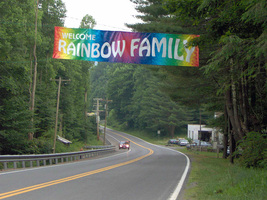 | Back to e-WV
| Back to e-WV
 The West Virginia Encyclopedia
The West Virginia Encyclopedia
 | Back to e-WV
| Back to e-WV
 The West Virginia Encyclopedia
The West Virginia Encyclopedia

In July 1980, the Rainbow Family held its annual reunion in Monongahela National Forest, at Three Forks of the Williams River in Webster County. News of the reunion provoked strong reactions, soon overshadowed by two murders associated with the event.
The Rainbow Family, a loosely organized group whose main activity is its annual reunion, has been variously characterized as hippies and drifters or as peaceful nature lovers and ecologists. The annual gatherings grew out of social, political, and cultural movements that had gained popularity in the 1960s and early 1970s. Included in these movements were back-to-the-landers, people who sought to return to a simpler, self-sustaining way of life; anti-war protesters; and hippies. In 1970, recognizing their common approach to life, they decided to stage a yearly event. The name ‘‘rainbow’’ was chosen to signify the diversity of people involved. The first gathering, in 1972, was near Aspen, Colorado, in the Roosevelt National Forest and on private land.
In the month before the West Virginia event, Secretary of State A. James Manchin and a group of Marlinton residents filed suit in federal court to bar the Rainbow Family from having its reunion in the Monongahela National Forest. At the time, Manchin was quoted in news reports as saying that West Virginia didn’t need ‘‘this bunch of derelict misfits.’’ Manchin also asked the U.S. Forest Service to withdraw the group’s camping permit. The federal court suit was dropped before the reunion started.
An estimated 6,000 people attended West Virginia’s Rainbow Gathering. For decades afterwards, tragic events associated with the 1980 gathering continued to make news. On June 25, 1980, two women who were apparently hitchhiking to the reunion were murdered on Droop Mountain, in southern Pocahontas County. On June 4, 1993, Jacob Beard, a Pocahontas County native, was convicted of killing the two women, Nancy Santomero, 26, of Huntington, Long Island, New York, and Vicki Durian, 26, of Wellman, Iowa. Beard’s conviction was overturned in 1999, and he was acquitted of the murders after his second trial on May 31, 2000.
Jacob Beard later filed a wrongful conviction suit, and Pocahontas County agreed to a $2 million settlement in January 2003. Beard’s release and second trial were in part the result of a 1997 confession to the murders by Joseph Paul Franklin, a white supremacist and serial killer. Franklin, whose confession in the Rainbow murders was challenged by some law enforcement officials, was executed in Missouri in November 2013 for an unrelated murder.
The Rainbow Family returned to West Virginia for a gathering in the Monongahela National Forest in 2005. The 2005 event was fairly uneventful except for a dispute between members of the Rainbow Family and the Forest Service over the agency’s requirement that the group obtain permits before congregating in the national forest.
In 2020, Emma Copley Eisenberg published The Third Rainbow Girl: The Long Life of a Double Murder in Appalachia about the 1980 murders. It was nominated for an Edgar Award for Best Fact Crime and named to The New York Times’ list of notable books released in 2020.